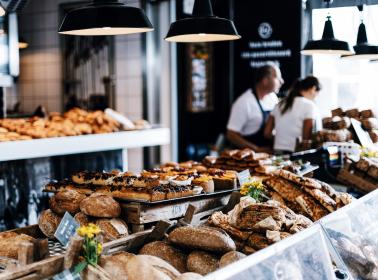BakeTex: Textile baking mat supports bakeries in saving energy
The ongoing energy crisis is increasingly pushing the bakery trade to its limits. Bakeries everywhere are having to close because they can no longer afford the sharp rise in the cost of electricity and gas. The use of energy-efficient ovens and the optimisation of production processes are important components that help to save energy. Researchers at the Fraunhofer Application Centre for Textile Fibre Ceramics TFK in Münchberg have now developed another building block: a textile baking base.
In bakeries, trays are normally used as a base for the baked goods in combination with baking paper or flour, which not only leads to large amounts of waste, but also to health problems (baker's asthma). The baking trays are also heavy and their mass increases the energy consumption in the oven, as they have to be heated with every baking process.
With this in mind, the Bavarian Research Foundation approved a research project in 2021 to develop an alternative to conventional baking trays, which was successfully completed in 2023. The project partners were the Fraunhofer Application Centre for Textile Fibre Ceramics TFK from Münchberg, Fickenschers Backhaus GmbH from Münchberg and Weberei Wilhelm Zuleeg GmbH from Helmbrechts.
The aim of the project was to develop an energy-saving, pollutant-free and reusable textile baking mat with an integrated non-stick effect for use in industrial bakeries. Lightweight and heat-resistant textiles offer the potential to lower the preheating temperature in the oven and thus reduce energy consumption.
In a first step, a thin para-aramid fabric made of 120 g/m² long staple fibre yarn was therefore produced and stretched on a metallic frame. "The leno weave proved to be particularly suitable for the weave. Its characteristic lattice structure ensures that the textile is not only light but also permeable to air," says Silke Grosch from the Fraunhofer Application Centre TFK.
"In addition, by fixing the threads in place, the fabric cannot warp during washing and retains its shape for a long time." Finally, a full-surface silicone coating ensures that the baked goods do not stick to the baking base. This means that the previously necessary baking paper and flour layer can be dispensed with. To ensure that the rolls come out of the oven just as crispy and brown as with a standard baking tray, only the baking programme needs to be adjusted. Another key advantage of the textile baking tray is that it can be folded and therefore stored in a space-saving manner.
In the course of the fourth industrial revolution (Industry 4.0), the baking tray will be equipped with intelligent additional functions. On the one hand, the production data in the bakery can be determined using RFID chips or QR codes, and on the other hand, baked goods can be advertised in a targeted manner using customised branding.
Prof. Dr Frank Ficker, Head of the Fraunhofer Application Centre TFK, sums up: "With the textile baking base, we have developed a contemporary and resource-saving product together with our project partners that is characterised by its low weight and high flexibility. Together with the potential energy savings, this makes it interesting for many bakeries."
The Fraunhofer Application Centre for Textile Fibre Ceramics TFK in Münchberg specialises in the development, manufacture and testing of textile ceramic components. It is part of the Fraunhofer Centre for High Temperature Lightweight Construction HTL in Bayreuth, a facility of the Fraunhofer Institute for Silicate Research ISC with headquarters in Würzburg.
energy saving technical yarns and fibers coating of technical textiles bakery Fraunhofer Application Centre for Textile Fibre Ceramics
Fraunhofer Application Centre for Textile Fibre Ceramics
Translation Textination


